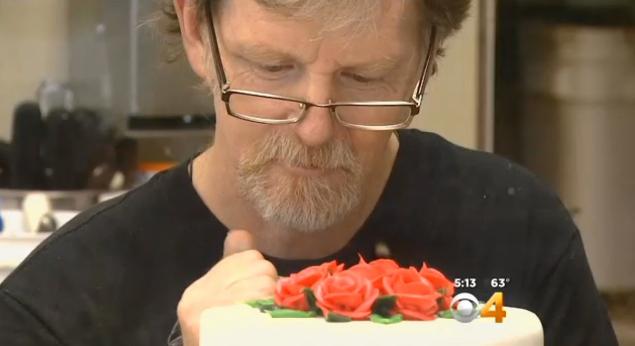 WASHINGTON — The U.S. Supreme Court has agreed to take the case of Masterpiece Cakeshop v. Colorado Civil Rights Commission and decide whether or not the government may order people of faith to use their talents for a same-sex celebration despite their belief that it would be a form of participation and thus a sin against God.
WASHINGTON — The U.S. Supreme Court has agreed to take the case of Masterpiece Cakeshop v. Colorado Civil Rights Commission and decide whether or not the government may order people of faith to use their talents for a same-sex celebration despite their belief that it would be a form of participation and thus a sin against God.
According to USA Today, “The justices … apparently decided that despite state laws barring discrimination based on sexual orientation, the merchants’ obligation to same-sex couples was not necessarily baked in the cake.”
The case will be heard this fall.
As previously reported, Dave Mullin and Charlie Craig visited Masterpiece Cakeshop in Lakewood, Colorado in July 2012 to look for options for their upcoming same-sex ceremony celebration. As Colorado—at the time—had a constitutional amendment enshrining marriage as being between a man and a woman, the men planned to travel to Massachusetts and then return to Colorado for a separate celebration.
However, after their arrival at the cake shop, Mullin and Craig were advised by owner Jack Phillips that he does not make cakes for same-sex ceremonies.
“My first comment was, ‘We’re getting married,’ and he just shut that down immediately,” Craig stated.
Phillips told Christian News Network that he does not make cakes for such events because of his Christian convictions.
“I’m a follower of Jesus Christ, and I believe that the relationship is not something that He looks favorably on,” the master pastry chef stated. “If Jesus was a carpenter, He wouldn’t make a bed for this union.”
Phillips, who attends a Baptist church, explained that when he informed Mullin and Craig that his bakery does not make cakes for same-sex “weddings,” the men immediately left. He stated that one of them made a comment on his way out the door that the bakery was a “homophobic cake shop.”
Phillips said that he told the men that he would be happy to make them any other type of baked goods outside of having to facilitate the ceremony, which he believed was a form of personal participation. But Mullin and Craig complained to the Colorado Human Rights Commission with the help of the American Civil Liberties Union (ACLU), and have prevailed in their case ever since.
In December 2013, Judge Robert Spencer sided with the ACLU, contending that Phillips should have made the cake because he was not told that there would be any words or symbols written on it.
“Phillips was not asked to apply any message or symbol to the cake, or to construct the cake in any fashion that could be reasonably understood as advocating same-sex marriage,” he wrote. “The act of preparing a cake is simply not ‘speech’ warranting First Amendment protection.”
In May 2014, the Colorado Civil Rights Commission upheld Spencer’s ruling, stating that Phillips violated the state’s civil rights law. The Commission then ordered that Phillips educate his staff in alignment with the Colorado Anti-Discrimination Act, to implement new policies in light of the ruling, and to file quarterly compliance reports for two years. The reports were to outline each pastry creation request that was declined and the reason why to prove that Phillips’ religious beliefs no longer influence his business decisions.
Phillips filed an appeal with the Colorado Court of Appeals, which upheld the lower court’s rulings in August 2015, asserting that providing the cake for the ceremony does not equal an endorsement of same-sex nuptials.
“Nothing in the record supports the conclusion that a reasonable observer would interpret Masterpiece’s providing a wedding cake for a same-sex couple as an endorsement of same-sex marriage rather than a reflection of its desire to conduct business in accordance with Colorado’s public accommodations law,” the court ruled.
The matter was appealed to the Colorado Supreme Court, which declined to hear the case last year. Therefore, Phillips took his case to the nation’s highest court, which agreed on Monday to be the arbiter in the issue.
“It is undisputed that the Colorado Civil Rights Commission … does not apply CADA [Colorado Anti-Discrimination Act] to ban (1) an African-American cake artist from refusing to create a cake promoting white-supremacism for the Aryan Nation, (2) an Islamic cake artist from refusing to create a cake denigrating the Quran for the Westboro Baptist Church, and (3) three secular cake artists from refusing to create cakes opposing same-sex marriage for a Christian patron,” the petition to the Supreme Court stated.
“Neither should CADA ban Jack Phillips’ polite declining to create a cake celebrating same-sex marriage on religious grounds when he is happy to create other items for gay and lesbian clients,” it declared.
“Jack’s ability to make a living and run his family business shouldn’t be threatened simply because he exercised his artistic freedom. Artists speak through their art, and when Jack creates custom wedding cakes, he is promoting and celebrating the couple’s wedding,” Alliance Defending Freedom (ADF) Senior Counsel Jeremy Tedesco also said in a statement.
“Jack will gladly allow anyone to purchase any product he sells, but he simply can’t put his artistic talents to use on a custom cake for an event so at odds with his faith convictions,” he continued. “The ACLU, which is opposing Jack and other artists in Washington and Arizona, would rather use the strong-arm of government to eradicate from the public square people whose views differ from the government’s. We hope the Supreme Court will affirm how illegitimate that is.”
Become a Christian News Network Supporter...


